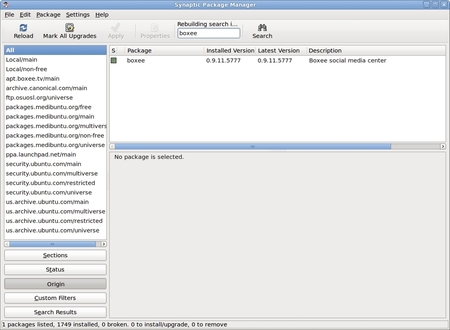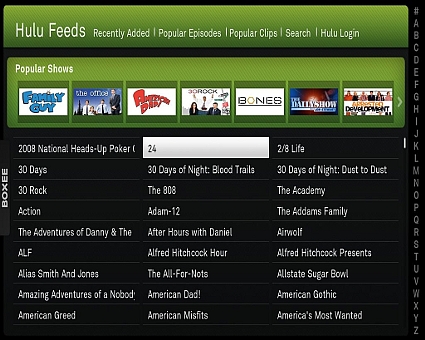Linux Boxee users get Hulu relief
Last updated Apr 25, 2009 — 17163 views The Linux version of Boxee’s eponymously-named multimedia platform has finally been updated to include several new features introduced into the OS X and Windows versions over the past few months. Key additions include an “App Box” and restored support for Hulu.
The Linux version of Boxee’s eponymously-named multimedia platform has finally been updated to include several new features introduced into the OS X and Windows versions over the past few months. Key additions include an “App Box” and restored support for Hulu.
Linux Boxee users may be able to upgrade to the new version of Boxee, version 0.9.11.5777M (April 26, 2009 build), by launching the Update Manager tool (Menu > System > Administration > Update Manager) on their Ubuntu systems. If that doesn’t do the trick, you can open up the Synaptic package manager (Menu > System > Administration > Synaptic), search for boxee using the “Quick Search” function, and then reinstall it by right-clicking on the program’s name and marking it for reinstallation.
Using Synaptic to add, remove, and/or update Boxee
(Click image to enlarge)
If all else fails, remove the package (right-click and mark for removal) and then install it fresh. Another approach is via apt-get from the command line, using a string of commands such as…
-
sudo apt-get update;apt-get remove boxee; apt-get clean; apt-get install boxee
Once updated, Boxee will exhibit an updated skin and a new “App Box” through which new applications, including Hulu feeds and more, can be added.
Users can select media sources using Boxee’s new “App Box”
(Click image to enlarge)
Here are a few more screenshots of the new Boxee version:
(Click each thumbnail to enlarge)





(Click each thumbnail to enlarge)
As noted above, the latest release restores support for Hulu, which disappeared several months ago.
Hulu returns to Boxee, but it’s not as clean as before
(Click image to enlarge)
The new Hulu function is not as clean as the original version, which was more tightely integrated into Boxee’s excellent and easy-to-use 10-foot user interface.
The current support for Hulu, an effort to sidestep Hulu’s content redistribution concerns, leverages Boxee’s RSS feeds in conjunction with a customized mozilla browser engine that’s part of the latest Boxee release. Evidence of this less-integrated approach is seen as Hulu’s home page momentarily flashes on the screen just prior to Hulu’s content menu (shown above) appearing on the screen.
Still lacking in the latest Linux release, however, is the long-awaited addition of Netflix movie and TV show streaming for subscribers to Netflix’s monthly service (with unlimited program streaming available for as little as $10 per month).
Boxee is available for free download from www.Boxee.tv, and is free to use. It’s available in Linux, Windows, Mac OS X, and AppleTV versions.






this version has been long awaited, and we are very happy to have finally brought it on par with the mac version.
regarding netflix, unfortunately netflix requires silverlight 2.0, which is currently unsupported on linux (silverlight 1.0 is supported by the efforts of the mono people in moonlight).
Thus another reason the Windows version of Boxee should be upgraded a little faster than it has been.
Hrm … still no 64-bit version, though.
I’m a sysadmin with a nice Lenovo T61p running Jaunty 64-bit. With the addition of the 64-bit Java plug-in, there’s nothing I can’t do on a daily basis.
Why would I go to 32-bit now? They need to work on a 64-bit version.
can boxee play hd content in .mkv format?
Dakota Smith,
We need to talk. I’m about to change from openSuSE11.1 to Jaunty.
I’ve that AMD dual-core 2.2GHz processor on my Notebook. And want to go 64-bit, and get my MTV for free!
Best Regards,
JJMacey
Phoenix, Arizona
That’s pretty nifty …but is this official support for hulu, otherwise they may just nuke it again.
Yes, boxee can play .mkv (x264, etc) files (and MPEG .ts files, etc)
There’s plenty of other fish to fry before a 64-bit version. But good luck… and why can’t you run the 32bit version on that 64bit box? Should work if you install the 32bit compat libs
Using 32 bit compat libs is just wasting resources.
Sixty Four Bits (and anyone else), there’s some help in the forums to get Boxee running on 64-bit Linux using chroot. While I haven’t tried to 32-bit libs way, I can only imagine — I never want to go back to the experience of 32-bit Firefox under 64-bit Ubuntu back when Adobe’s Flash plugin was 32-bit only.
A waste of resources is a bit of an exaggeration. CPU overhead is negligible, memory usage increase depends on whether any of the 32-bit libs needed to get Boxee running are already loaded in 64-bit form, and increased disk space is a definite although what’s a few hundred MB when our hard drives are measured in TB?
A waste of end-user time is more accurate. The time wasted on everyone’s part (the time the experts take to nail it down and script it or post directions + the time others spend executing said scripts and directions) can be better spent elsewhere. But then you start getting into a touchy area of open source. You are free to grab the code and work on it if you like, but not every end-user has the ability to code. In lieu, you can offer to test code and send bug reports on features you want, but not every end-user has the ability to be a good tester, either.
I think by now the devs have a pretty good idea that there’s a demand for 64-bit. Noise is made everywhere for 64-bit Boxee. But every platform Boxee is coded for handles 64-bit differently. Mac OS X only gets 64-bit support in Leopard (10.5). Windows XP Pro 64-bit is based on Windows Server 2003, and Vista 64-bit is (was?) notorious for lack of driver support. Under Linux, it’s all-32 or all-64, as evidenced by 32-bit compat libs. Boxee is still alpha, so it’s best to go with 32-bit for broader support and get things working there first. Once things stabilize in beta or RC, I’m sure the devs will add 64-bit.